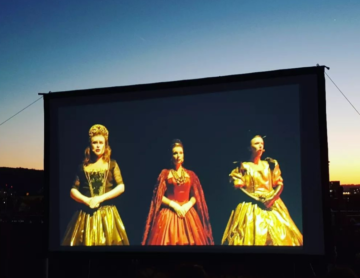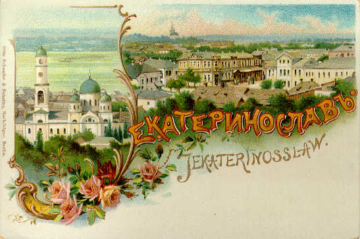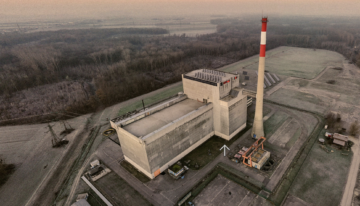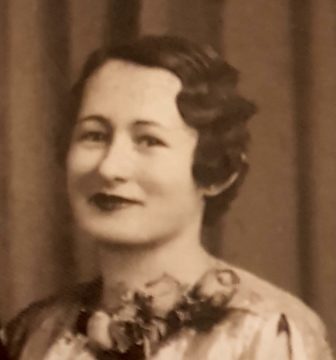by Rafaël Newman
 My father’s mother—Annie Newman, my grandmother or Bubbi—was born Hannah Dubin in a shtetl in what is now Ukraine a few years before the Great War. One of her earliest recollections—in addition to the image of her own grandmother hiding in a baby carriage to escape marauding Cossacks—was of being able to see troop movements from the roof of her house, presumably during the Russian Imperial Army’s advance against Austria-Hungary, an engagement that occurred in Galicia, farther to the west, in 1914. Much later, in the aftermath of the nuclear accident in Chernobyl in 1986, when that obscure place was suddenly on everyone’s lips, she began recalling that her village, which she called Priut, in a region she referred to by its Russian name as Екатеринославская губернія, or Yekaterinoslavskaya guberniya—the Yekaterinoslav Governorate, a province of the Russian Empire—was not far from that site, which had now become infamous for a catastrophic meltdown.
My father’s mother—Annie Newman, my grandmother or Bubbi—was born Hannah Dubin in a shtetl in what is now Ukraine a few years before the Great War. One of her earliest recollections—in addition to the image of her own grandmother hiding in a baby carriage to escape marauding Cossacks—was of being able to see troop movements from the roof of her house, presumably during the Russian Imperial Army’s advance against Austria-Hungary, an engagement that occurred in Galicia, farther to the west, in 1914. Much later, in the aftermath of the nuclear accident in Chernobyl in 1986, when that obscure place was suddenly on everyone’s lips, she began recalling that her village, which she called Priut, in a region she referred to by its Russian name as Екатеринославская губернія, or Yekaterinoslavskaya guberniya—the Yekaterinoslav Governorate, a province of the Russian Empire—was not far from that site, which had now become infamous for a catastrophic meltdown.
This concatenation of private and public, domestic and historical elements was understandably striking, and I later incorporated it into a text about my grandparents, all four of them born in the early decades of the 20th century in various parts of central Europe, all four immigrants to Canada between the wars:
My father’s father saw the light
in a land-locked province of the Czar’s
upon the Titanic’s final night;My father’s mother’s native stars
were shared with a view of World War I
near Chernobyl on the Cossack marsh;My mother’s mother fled the Hun
and the aulas of an academy
where marks were granted with the gun;My mother’s father left Germany,
a nascent crematorium,
to rid New-World flats of verminry.Now, there’s been no moratorium
in ruin’s vast emporium,
for ontogeny’s feeble gains are won
with blood, as phylogeny’s ever done;
and my sires and dams traded general night
for a series of days with their several plights.But for all that pro toto they suffered as pars,
and no triumph of Venus could quite dispel Mars—
yet what seemed their calamitous destiny
was a talent for dodging catastrophe.
I gave the poem, which has since been published in a collection, the title “Antistrophe.” This is the technical term for the second stanza of a choral ode in a Greek tragedy, the “counterturn” in which the chorus, having considered in the “strophe” the situation it finds itself in during the course of the play’s action, now adopts a different, often gloomier perspective on the events it has witnessed: a turn from major to minor, as it were; or, as in certain tragedies, the juncture at which the song moves from sinister premonition to more profoundly dark certainty. In the case of my grandparents, however, what I was trying to suggest was that, contrary to the dire auspices under which they had grown up—my grandfather, or Zaideh, born on the night the Titanic sank; my Swiss grandmother, or Grossmutti, studying in Munich during Hitler’s putsch; my German grandfather, or Grossvati, exposed to extreme poverty in interwar Bavaria; not to mention my Bubbi’s experience of pogroms in the ominous vicinity of a future major disaster—their lives had ultimately turned out all right, thanks to their flight from the Old World to the New. An antistrophe for the better, in the end; a history of catastrophes avoided.
 Recently, of course, I have been learning many more Ukrainian place names in addition to Chernobyl, albeit, unfortunately, for reasons no less catastrophic: Bakhmut, Bucha, Mariupol, Zaporizhzhia… And as my attention has been drawn to maps of the region, thanks to Timothy Snyder’s superlative lecture series (“The Making of Modern Ukraine,” an undergraduate history course given at Yale University in the fall of 2022 and available in its entirety online), it has become clear to me that my Bubbi must have been mistaken in the location of her native village: Chernobyl, I see now, is a considerable distance both from the Yekaterinoslav Governorate and from the only village I have found on Google maps by the name of Priut (or Pryyut), which seems in turn not to have been in the region she mentioned, but rather in Mikolaiv, a neighboring oblast not contained within the superseded historical province. Now, this is not particularly surprising, since, as I have written elsewhere, Bubbi was still very young when she left her homeland, so that, by the time she reconstructed Ukrainian geography for her grandson, more than six decades had passed.
Recently, of course, I have been learning many more Ukrainian place names in addition to Chernobyl, albeit, unfortunately, for reasons no less catastrophic: Bakhmut, Bucha, Mariupol, Zaporizhzhia… And as my attention has been drawn to maps of the region, thanks to Timothy Snyder’s superlative lecture series (“The Making of Modern Ukraine,” an undergraduate history course given at Yale University in the fall of 2022 and available in its entirety online), it has become clear to me that my Bubbi must have been mistaken in the location of her native village: Chernobyl, I see now, is a considerable distance both from the Yekaterinoslav Governorate and from the only village I have found on Google maps by the name of Priut (or Pryyut), which seems in turn not to have been in the region she mentioned, but rather in Mikolaiv, a neighboring oblast not contained within the superseded historical province. Now, this is not particularly surprising, since, as I have written elsewhere, Bubbi was still very young when she left her homeland, so that, by the time she reconstructed Ukrainian geography for her grandson, more than six decades had passed.
That my grandmother should have located the village of her birth in the vicinity of Chernobyl does, however, make a certain rhetorical, indeed political sense, since that name dominated the late 1980s as a sign of things to come—human-made environmental malaise; technological progress run amuck; a turn in the Cold War and a change in the balance of power—and thus had become a symbol not merely of a senescent and unstable Soviet Union, but also of a world in which the human species in general, not just my Bubbi, was increasingly less and less securely at home: a name for a place we had come from, and to which it was unlikely we would ever be able to return.
Meanwhile, since February of last year, I have come to know a whole new generation of Ukrainian refugees—or rather, “people on the move,” the revised, less essentializing, less stigmatizing parlance—in my own adopted home of Switzerland. Among them are two young architects, Lilit Hakopyan and Sasha Lebid, who, together with Anna Bertram, a German dramaturge, and Hella Wiedmer-Newman, a Swiss-Canadian art historian who also happens to be my daughter, run 2402forum, which “exercises cultural resistance against the russian [sic] military aggression.” The collective was founded soon after Putin’s full-scale invasion on February 24, 2022, hence the numerical component of its name; the verbal element, “forum,” signals the collective’s democratic commitment. In the remarks that typically precede their events, however, Lilit Hakopyan is always at pains to identify the current action as merely the latest phase in a war that began in February of 2014 with the Russian annexation of Crimea, and continued in the intervening years with skirmishes in the eastern regions of Ukraine—a tally of the number of days the war has lasted so far, akin to the Guardian newspaper’s running count, is regularly projected onscreen, with an asterisk recalling the place of the “special operation” in a longer Russian campaign against Ukraine.
2402forum, which has recently been granted financial support from the city of Zurich under a special plan for temporarily resident Ukrainian culture workers, stages “events in the context of a critical engagement with art and cultural production from Ukraine.” Foremost among these events is a film series, or “Cinema Circle,” featuring work by Ukrainian directors. The collective had intended initially to show films directly concerned with the war, and thus to foster discussion of the ongoing crisis, and to ensure that a public overwhelmed by a 24/7 news cycle not subside into apathetic satiation. Thus they began with works like Atlantis (2019), by Valentyn Vasyanovich, and The Earth Is Blue as an Orange (2020), by Iryna Tsilyk, each in its own particular way addressing Ukraine’s uneasy and often violent relationship with its much larger, predatory neighbor and former “brother nation”. (Hella has written, in German, about the two films, as an expression of pessimism and an act of resistance, respectively, here.) They soon broadened their scope to include selections with a more general view of the modern Ukrainian experience, such as Askania (2019), by Andrii Lytvynenko, on Europe’s largest nature reserve, in Southern Ukraine; or the three short films they showed this past April, grouped under the title “A City Within a Building” and attesting to their professional interest in the built environment: The Dovecotes of Kyiv (2023), by Mykhailo Volkov; Facade Colour: Blue (2019), by Oleksiy Radynski; and Mariupol: A City within a Building (2023), by The Center for Spatial Technologies. They have also proposed a more diachronic view of Ukrainian cinema, with classics like Zemlya (1930), by Oleksandr Dovzhenko, and the remarkable Man with a Movie Camera (1929), by Dziga Vertov, each a poignant celebration of the creativity and optimism of the Ukrainian arts scene in the looming shadow of collectivization and the Holodomor.
And of course, the nation’s imperialist neighbors—which have included not only Russia but also Germany and Poland—and its legacy of murderous oppression are never far from the concerns of any of these works, whether present as the tokens of fascism casually included by Vertov in his sequence at a fun fair, or as live combat actually occurring on the margins of Mariupolis (2016), by Mantas Kvedaravičius. This latter, a matter-of-fact but exceptionally affecting documentary depicting the coexistence of Ukrainians with the descendants of ancient Greek colonists in the Russian-founded southern port city of Mariupol, maintains a committed focus on the everyday pleasures of streetcar rides, community theater performances, and fishing trips, while the Russian invasion that began with the annexation of nearby Crimea in 2014 continues in the neighboring region of Donbas; Mariupolis thus, like Tom Stoppard’s Rosencrantz and Guildenstern Are Dead, reverses the proportions of main action to secondary, and valorizes the otherwise marginalized characters in a “historic” conflict. And it is lent a retroactive pathos by the fact that Kvedaravičius was killed in the attack on Mariupol in 2022 while working on a sequel.
The vicissitudes of the Ukrainian national project, in what Timothy Snyder has called the “Bloodlands” of Europe, that strip of territory from the Baltic to the Black Sea located between the lethal tectonic plates of Teutonic and Muscovite expansion, is lent veritable Biblical force in Iyov (2015), Vlad Troitskyi’s staging of an “opera-requiem” by the creative team of Roman Grygoriv and Illia Razumeiko. The singers are grouped around a “prepared piano,” which, with its lid removed and strings and soundboard laid bare, resembles a flayed corpse in a Francis Bacon tableau; meanwhile, from a catwalk behind and above them, an actress recites excerpts from the Book of Job in Ukrainian. The instrument is played, struck, twanged, and variously mistreated as the troupe perform a litany, sometimes simply whispering, sometimes cacophonous, occasionally melodious, that mingles references to Baroque, jazz, avant-garde, and folkloric genres. When towards the end of their uncanny performance a conductor, accompanied by a more conventional string ensemble, appears and leads them in a Latin requiem, the classical progressions are like a voice from the future, a Christian-inflected hope for redemption through suffering. This hope is, however, ultimately dashed in the darkness of Job’s pre-Christian, indeed pre-Jewish God, a vain, vengeful, psychopathic narcissist reminiscent of archaic pagan deities as well as of the various “leaders” who have preyed on Ukraine for centuries, the latest of whom is tormenting it to this day: the way that Job, or the prepared piano that stands in for him, is tormented before the eyes and ears of the opera’s audience.
Iyov is an utterly absorbing, thoroughly accomplished ensemble work of neo-opera. The version 2402forum showed, the film of a production at GogolFest in Kyiv in 2015, was a peak experience, both artistic and sociological, since it was followed by the collective’s typical reflection session, at which the participants included several members of the Ukrainian community in Zurich and beyond, and the discussion was thus charged with emotion. But the high point in 2402forum’s Cinema Circle was reached—quite literally—at last summer’s screening of Chornobyldorf (2022), by Grygoriv and Razumeiko, the same duo that had created Iyov. Since its inception, 2402forum has been an itinerant organization, meeting in the private homes of its members and staging its events at a variety of venues, mostly public, city-run spaces: these include the Rote Fabrik, a cultural center in a decommissioned factory that was ceded in the 1980s to the city’s discontented youth; the Zentralwäscherei, an abandoned industrial laundry facility on the grounds of a major urban renewal project; and the Helferei, the clergy house of Zurich’s landmark Grossmünster, where the “people’s priest” Ulrich Zwingli resided while leading the Swiss Reformation in the early 16th century. On August 10, 2022, however, the day on which Chornobyldorf was slated for screening, none of these locations was available, so the collective projected the film on a makeshift screen rigged up on the roof of a colleague’s private residence, a low-rise apartment building on Langstrasse in Zurich’s 4th district.
It was a temperate summer evening, comfortable enough for sitting outside; but a persistent slight breeze meant the group had to keep a close eye on their moorings and ballast. The movement of the air made for some interference with the audio as well, and when the event began, the summer evening sun was still bright enough to wash out the screen, where one of the two composers of the opera we were about to watch, Illia Razumeiko, joined us by Zoom from Ukraine to formulate some of the ideas that had gone into the new work. In particular, Razumeiko provided us with a detail that does not become evident during the opera’s 2 ½-hour running time: that the title is a portmanteau, a combination of the names “Chernobyl” (in a transliteration from the Cyrillic more accurately representing its pronunciation) and “Zwentendorf,” the name of a commercial nuclear reactor built in Austria in the 1970s, but, following a referendum in 1978, never commissioned. The work’s title thus points in two opposed directions at once: to the past, in which the catastrophe of Chernobyl has taken place, and to the future, in which other outcomes are still possible. And, with Russian forces having taken control of the Zaporizhzhia nuclear power station just months before the screening, and with combat continuing in Zaporizhzhia oblast (a province that had in fact been part of the Yekaterinoslav Governorate), these alternate narratives were, in a very real sense, in the air.

The ghostly onscreen apparition of the composer, his voice fading in and out with the breeze, then gave way to the evening’s screening, which came increasingly into focus as the summer light waned. There was, however, no lessening of the uncanny impression, since Chornobyldorf, an “archeological opera in seven novellas,” valiantly refuses narrative coherence, preferring instead to remain on the verge of portentous, often quite gorgeous nonsense. Indeed, with a wan play on words, Grygoriv and Razumeiko identify their form of musical theater as opera aperta, a term borrowed from Umberto Eco and typically translated simply as “open text,” a literary artifact capable of polysemous interpretations. The composers cram their exploration of past and future catastrophe (and potential redemption) with fragments of music borrowed from a disparate range of traditions—Baroque opera, Ukrainian folk song, techno beats—and tableaux gesturing at an equally multiple iconography. Thus there are references, visual and auditory, to Elektra, Ulysses, Daphne, Susannah, Coppélia, and the pre-Socratics, as well as to Lenin, agrarian and shamanic ritual, and Catholic liturgy. There is an extended and very funny sequence involving a trio of “divas,” both male and female singers dressed in Tenniel-inspired, Red Queen drag and voguing in a manner reminiscent of William Christie’s staging of Lully’s Atys, a French court opera of the Baroque era about the Lydian deity Cybele, who is worshipped with percussion instruments and whose priests castrate themselves in her honor (prefigured here by the early appearance of a goddess sporting a transistor headdress and bedecked with cymbals); there are filmed incursions that seem to depict a rural ceremony, whether religious or administrative; and there is a remarkable scene, in one of the opera’s later “novellas,” in which a naked Orpheus, who appears to have been crucified, or encaged, declares that Eurydice does not exist, that she is merely “illusion, fiction, distortion…fairy tale, myth, new opera of the old world,” in keeping with the unsettling prologue to the work, which features a Wizard of Oz-like figure, a flattened Mask of Agamemnon with the traits of Voldemort in extreme and distorted closeup, challenging the audience’s expectations of intelligibility with a stream of gobbledy-gook.

This unwieldy, otherworldly pageant, viewed from a rooftop in the gathering darkness, took on the allure of an oracle, of a communiqué from another time, part past and part future. And, as we were encouraged, by Illia Razumeiko over Zoom, to consider the implications of the ongoing siege of Ukraine, and in particular the Russian occupation of Zaporizhzhia, in parallel with the history of genocide and industrial catastrophe of which the Bloodlands are both heir and staging grounds, I recalled my Bubbi, Annie Newman née Hannah Dubin, herself remembering the way she could watch the course of the Great War from her rooftop, decades before, in a village that may or may not have been in the Yekaterinoslav Governorate, and which may or may not have been near Chernobyl, a town not yet infamous, in the once and future land of Ukraine.
Once, when my father, Annie’s son, visited us in Zurich, soon after the 1999 Columbine shooting in the United States, he said he had the impression that the Swiss enjoyed an improbable tranquility, perched together atop an Alpine peak, at a comfortable remove from the assault weapons that were randomly terrorizing the nation not far to the south of where he lived. His vantage point of Canada, in other words, no longer felt as safe as it once had; and, if it wasn’t quite as precarious as a rooftop in a shtetl preyed on by rampaging Cossacks and in the path of the Czar’s forces, yet my father could sense the tide of violence beginning to lap at its foundations. In Switzerland, meanwhile, he felt we were still far enough away from danger: a reversal of the dichotomy of his parents’ generation, in which the New World afforded sanctuary from the Old. Now, Putin’s war on Ukraine has reversed the tide once again; and although we continue to enjoy peace and prosperity in Switzerland, the latter is due in part to the Swiss establishment’s craven refusal to act decisively against the sources of financing for Putin’s project, to be found in Swiss financial and commercial institutions, while the former is being increasingly challenged, if not actively disrupted, by the presence in our midst of eyewitnesses to the genocidal campaign being waged not a very considerable distance by land from our comfortable perch.
I am grateful to those eyewitnesses and, in particular, to 2402forum, for reminding me to remain vigilant, while also actively protesting and resisting by whatever means available to me; and to remember that my privileged position, ostensibly safe above the fray, is only a matter of chance, and is susceptible to the same aleatory historical forces that choreographed my grandparents’ antistrophe.
2402forum will be screening Chornobyldorf a second time, on May 31, 2023, at the Helferei in Zurich, on which occasion I will make some introductory remarks.
